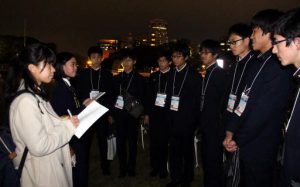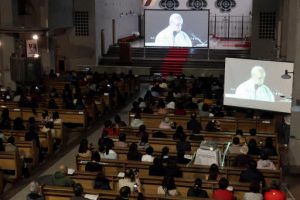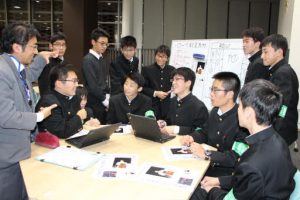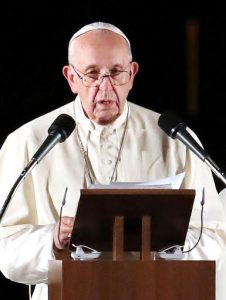Junior Writers Reporting: Junior writers hold Pope’s speech close to their hearts
Dec. 10, 2019
On November 24, Pope Francis visited the A-bombed cities of Hiroshima and Nagasaki for the first time in 38 years. In the Hiroshima Peace Memorial Park, located in the city’s Naka Ward, he criticized the use or possession of nuclear weapons and called on all people around the world to take action to advance the elimination of such weapons. The junior writers of the Chugoku Shimbun listened to the speech given by the Pope in the Peace Memorial Park and the Catholic Church in Nobori-cho, located in Naka Ward, where a public screening was held. Listening to the Pope’s message of peace, we renewed our determination to stress the inhumanity of the atomic bombing.
About 2,000 church staff members and A-bomb survivors, among others, took part in the “Meeting for Peace,” held in the Peace Memorial Park. The junior writers interviewed several of those in attendance at a press space in the rear of the park.
When the Pope appeared at the venue amidst the tense atmosphere at 6:43 p.m., a loud cheer and applause broke out. The Pope gently held the hands of A-bomb survivors, who welcomed him, and there was a moment when the Pope cuddled with a female A-bomb survivor who was shedding tears.
The Pope offered a bouquet of flowers and prayer to the Cenotaph for the A-bomb Victims. As he did in the Atomic Bomb Hypocenter Park in Nagasaki, he offered a long and polite prayer. He was listening attentively to A-bomb survivors’ testimonies with a serious look. It was unforgettable that he repeated the word, “peace” in a 14-minute speech in Spanish.
After the meeting ended, many people were placing their hands together in front of the Cenotaph for the A-bomb Victims. It seemed the Pope’s speech evoked strong impressions in the participants, and their hearts were united. Yoko Kubota, 76, a resident of Nishi Ward who experienced the atomic bombing when she was two years old, said, “The Pope delivered the speech on behalf of the A-bomb survivors, so I was encouraged.”
It was a pity the Pope stayed in Hiroshima only 51 minutes and did not visit the Hiroshima Peace Memorial Museum. However, he gave a strong impact from the A-bombed city to the world. I hope that this will lead the international community toward discussion for a world without nuclear weapons.
About 450 people gathered for the public screening of the “Meeting for Peace,” held in the Catholic Church in Nobori-cho.
First, Father Hiroshi Katayanagi, 48, at the Catholic Ube Church, located in the City of Ube, introduced the Pope’s career and personality. According to Father Katayanagi, Pope Francis joined the Society of Jesus when he was 21 years old. The Pope asked to become a missionary to Japan but gave up the attempt because of a lung disease.
Pope Francis became Provincial of the Jesuits in Argentina when he was 36 years old. Back then, citizens who were regarded as antigovernment by the military dictatorship were cruelly tortured, but he was considerate of people’s agony and fought bravely against the dictatorship. His achievements were recognized, and he was elected as the new Pope in 2013.
Father Katayanagi also explained the Pope had been living in a modest guest house, turning his attention to the poor, instead of living in the Vatican Palace after he had been appointed the Pope.
When the meeting started, the participants watched the progress of the event displayed on the large screen. It was impressive that they were listening attentively to the Pope as if they had been holding his speech close to their hearts. Kiyoshi Fujiwara, 59, a resident of Naka Ward, said, “I could understand the Pope’s feelings of profound mourning for the A-bomb victims.”
Newspaper club members at Sotoku High School, located in Nishi Ward, gathered information about the Pope’s visit to Hiroshima, made school newspapers, and handed out them in the school.
Asahi Inoue, 17, and Ryota Masui, 16, both of whom were second-year high school students, took part in the “Meeting for Peace,” taking notes and photos. Looking back on that time, Mr. Inoue said, “The Pope spoke in a moderate tone, but I felt his strong will to desire the elimination of nuclear weapons.”
After the “Meeting for Peace,” three students, including Takuto Toyoshima, 16, a president of the club and a second-year high school student, carried out a survey around the Peace Memorial Park, asking, “Will the Pope’s visit to Hiroshima lead to the elimination of nuclear weapons?” They collected about 50 surveys.
They compiled the Pope’s speech and interviews to high school students who took part in the meeting from other prefectures on a B4-size paper, a “prompt report,” and posted it in every area junior high and senior high school classroom within two days of the Pope’s visit. Within the year, they plan to make a newspaper about ten pages long that will include the findings. The paper will be handed out to the school’s roughly 1,300 students. Mr. Toyoshima said with enthusiasm, “I hope to think with the students of this school about what the young can do for peace through the newspaper.”
Below, five junior writers, who took part in gathering information, introduce the Pope’s words that especially remain in their hearts and what they felt about the Pope’s speech in Hiroshima.
1. Peace is no more than an empty word unless it is founded on truth, built up injustice, animated and perfected by charity, and attained in freedom.
I again realized the importance of taking action for peace. The junior writers’ activities are among it. I decided to continue to take action. (Tokitsuna Kawagishi, 18)
2. How can we propose peace if we constantly invoke the threat of nuclear war?
It was the first time for me to hear the leader of a nation denouncing states that refused to relinquish their nuclear weapons. I hope his speech will lead to a movement to eliminate nuclear weapons throughout the world. (Yuna Okajima, 15)
3. A true peace can only be an unarmed peace.
I want to convey the Pope’s words especially to the leaders of nuclear weapon states, in addition to Japan that depends on the nuclear umbrella. (Ayu Hayashida, 15)
4. It is a memory that ensures and encourages the building of a more fair and fraternal future.
I thought the Pope had demanded that handing down the memory should be necessary so that the future generations would not repeat the misery of the atomic bombing. (Haruka Oikawa, 16)
5. Our world, interconnected not only by globalization but by the very earth we have always shared.
I’ve understood that we can build peace not only by recognizing the differences in languages and cultures but also by thinking that the people around the world are joined by a common destiny. (Akane Sato, 17)
(Originally published on December 10, 2019)
Giving a strong impact from the A-bombed city to the world
About 2,000 church staff members and A-bomb survivors, among others, took part in the “Meeting for Peace,” held in the Peace Memorial Park. The junior writers interviewed several of those in attendance at a press space in the rear of the park.
When the Pope appeared at the venue amidst the tense atmosphere at 6:43 p.m., a loud cheer and applause broke out. The Pope gently held the hands of A-bomb survivors, who welcomed him, and there was a moment when the Pope cuddled with a female A-bomb survivor who was shedding tears.
The Pope offered a bouquet of flowers and prayer to the Cenotaph for the A-bomb Victims. As he did in the Atomic Bomb Hypocenter Park in Nagasaki, he offered a long and polite prayer. He was listening attentively to A-bomb survivors’ testimonies with a serious look. It was unforgettable that he repeated the word, “peace” in a 14-minute speech in Spanish.
After the meeting ended, many people were placing their hands together in front of the Cenotaph for the A-bomb Victims. It seemed the Pope’s speech evoked strong impressions in the participants, and their hearts were united. Yoko Kubota, 76, a resident of Nishi Ward who experienced the atomic bombing when she was two years old, said, “The Pope delivered the speech on behalf of the A-bomb survivors, so I was encouraged.”
It was a pity the Pope stayed in Hiroshima only 51 minutes and did not visit the Hiroshima Peace Memorial Museum. However, he gave a strong impact from the A-bombed city to the world. I hope that this will lead the international community toward discussion for a world without nuclear weapons.
Public screening in the Catholic Church in Nobori-cho
About 450 people gathered for the public screening of the “Meeting for Peace,” held in the Catholic Church in Nobori-cho.
First, Father Hiroshi Katayanagi, 48, at the Catholic Ube Church, located in the City of Ube, introduced the Pope’s career and personality. According to Father Katayanagi, Pope Francis joined the Society of Jesus when he was 21 years old. The Pope asked to become a missionary to Japan but gave up the attempt because of a lung disease.
Pope Francis became Provincial of the Jesuits in Argentina when he was 36 years old. Back then, citizens who were regarded as antigovernment by the military dictatorship were cruelly tortured, but he was considerate of people’s agony and fought bravely against the dictatorship. His achievements were recognized, and he was elected as the new Pope in 2013.
Father Katayanagi also explained the Pope had been living in a modest guest house, turning his attention to the poor, instead of living in the Vatican Palace after he had been appointed the Pope.
When the meeting started, the participants watched the progress of the event displayed on the large screen. It was impressive that they were listening attentively to the Pope as if they had been holding his speech close to their hearts. Kiyoshi Fujiwara, 59, a resident of Naka Ward, said, “I could understand the Pope’s feelings of profound mourning for the A-bomb victims.”
Newspaper club members at Sotoku High School hand out school newspapers featuring Pope Francis
Newspaper club members at Sotoku High School, located in Nishi Ward, gathered information about the Pope’s visit to Hiroshima, made school newspapers, and handed out them in the school.
Asahi Inoue, 17, and Ryota Masui, 16, both of whom were second-year high school students, took part in the “Meeting for Peace,” taking notes and photos. Looking back on that time, Mr. Inoue said, “The Pope spoke in a moderate tone, but I felt his strong will to desire the elimination of nuclear weapons.”
After the “Meeting for Peace,” three students, including Takuto Toyoshima, 16, a president of the club and a second-year high school student, carried out a survey around the Peace Memorial Park, asking, “Will the Pope’s visit to Hiroshima lead to the elimination of nuclear weapons?” They collected about 50 surveys.
They compiled the Pope’s speech and interviews to high school students who took part in the meeting from other prefectures on a B4-size paper, a “prompt report,” and posted it in every area junior high and senior high school classroom within two days of the Pope’s visit. Within the year, they plan to make a newspaper about ten pages long that will include the findings. The paper will be handed out to the school’s roughly 1,300 students. Mr. Toyoshima said with enthusiasm, “I hope to think with the students of this school about what the young can do for peace through the newspaper.”
Below, five junior writers, who took part in gathering information, introduce the Pope’s words that especially remain in their hearts and what they felt about the Pope’s speech in Hiroshima.
The Pope’s words in his speech in Hiroshima that impressed us
1. Peace is no more than an empty word unless it is founded on truth, built up injustice, animated and perfected by charity, and attained in freedom.
I again realized the importance of taking action for peace. The junior writers’ activities are among it. I decided to continue to take action. (Tokitsuna Kawagishi, 18)
2. How can we propose peace if we constantly invoke the threat of nuclear war?
It was the first time for me to hear the leader of a nation denouncing states that refused to relinquish their nuclear weapons. I hope his speech will lead to a movement to eliminate nuclear weapons throughout the world. (Yuna Okajima, 15)
3. A true peace can only be an unarmed peace.
I want to convey the Pope’s words especially to the leaders of nuclear weapon states, in addition to Japan that depends on the nuclear umbrella. (Ayu Hayashida, 15)
4. It is a memory that ensures and encourages the building of a more fair and fraternal future.
I thought the Pope had demanded that handing down the memory should be necessary so that the future generations would not repeat the misery of the atomic bombing. (Haruka Oikawa, 16)
5. Our world, interconnected not only by globalization but by the very earth we have always shared.
I’ve understood that we can build peace not only by recognizing the differences in languages and cultures but also by thinking that the people around the world are joined by a common destiny. (Akane Sato, 17)
(Originally published on December 10, 2019)











